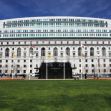During the height of the COVID-19 pandemic, many businesses were forced to close their doors in light of mandatory quarantines and lockdowns. Customer-facing businesses were hit especially hard, including restaurants, movie theaters, medical offices, fitness centers, and others. Many sought coverage for the millions in lost revenue under their “business interruption” insurance policies. Insurance companies pushed back, claiming that virus-related closures are not the kind of business interruption contemplated by these policies. Lawsuits abound. The Washington Supreme Court recently became the latest jurisdiction to side with the insurance companies and rule against coverage.
The facts and arguments presented in Hill & Stout, PLLC v. Mut. of Enumclaw Ins. Co. are representative of the national battle between insurance providers and companies harmed by pandemic-related closures. Hill & Stout, a dental practice, held a property insurance policy issued by Mutual of Enumclaw Insurance Company. Hill & Stout was forced to close to the public during the pandemic, costing the office substantial revenue. The insurance policy included coverage for lost business income, so long as the loss was sustained due to necessary suspension of operations caused by “direct physical loss of or damage to” the dental office.
Hill & Stout, like other pandemic loss cases, turned primarily on the definition of “direct physical loss.” Direct physical loss usually means damage to the physical premises due to, for example, fire, flood, or a nearby collapsing building. The Washington Supreme Court ruled that COVID-related closure, even if mandated by the government, did not constitute a “direct physical loss.” There was no physical destruction, and nothing physically prevented the dentists from entering their place of business.
The court also held that the policy’s virus exclusion applied. The policy included an exclusion for “for loss or damage caused directly or indirectly by ny virus … that induces or is capable of inducing physical distress, illness or disease.” Such virus exclusions became standard after the SARS outbreak in 2003. The virus exclusion applies when the virus “directly and solely results in loss or damage,” or “initiates a sequence of events that results in loss or damage, regardless of the nature of any intermediate or final event in that sequence.” Here, the coronavirus began the causal chain leading to the loss.
Following the decision, a number of Washington businesses have given up hope that their claims would be covered. A cafe in Seattle voluntarily dismissed its Ninth Circuit appeal in a case against Scottsdale Insurance Company, as did a Seattle-area fitness center harboring similar claims. The dismissals reflect a concession that the Washington high court’s case both controls and clearly dooms their arguments.
Washington joins other jurisdictions issuing insurer-friendly opinions in similar cases. Federal courts in a wide swath of jurisdictions, including the 2nd, 5th, 6th, 7th, 8th, 9th, 10th, and 11th circuits have found COVID losses do not qualify as property damage for the purposes of business interruption insurance. As summarized in a recent New York federal court opinion, for example: New York courts consistently hold “direct physical loss of or damage language requires physical damage to invoke coverage, and that loss of use due to the pandemic does not constitute physical damage when the covered property was physically unharmed by the virus.”
Certain state courts have gone the other way, ruling against the prevailing federal standard and allowing the question of whether COVID-19 causes physical loss to proceed to discovery. These courts have relied more heavily on the general principle that ambiguities in an insurance policy should be resolved in favor of coverage. The general trend, however, appears to favor insurance providers in coronavirus business loss cases.






